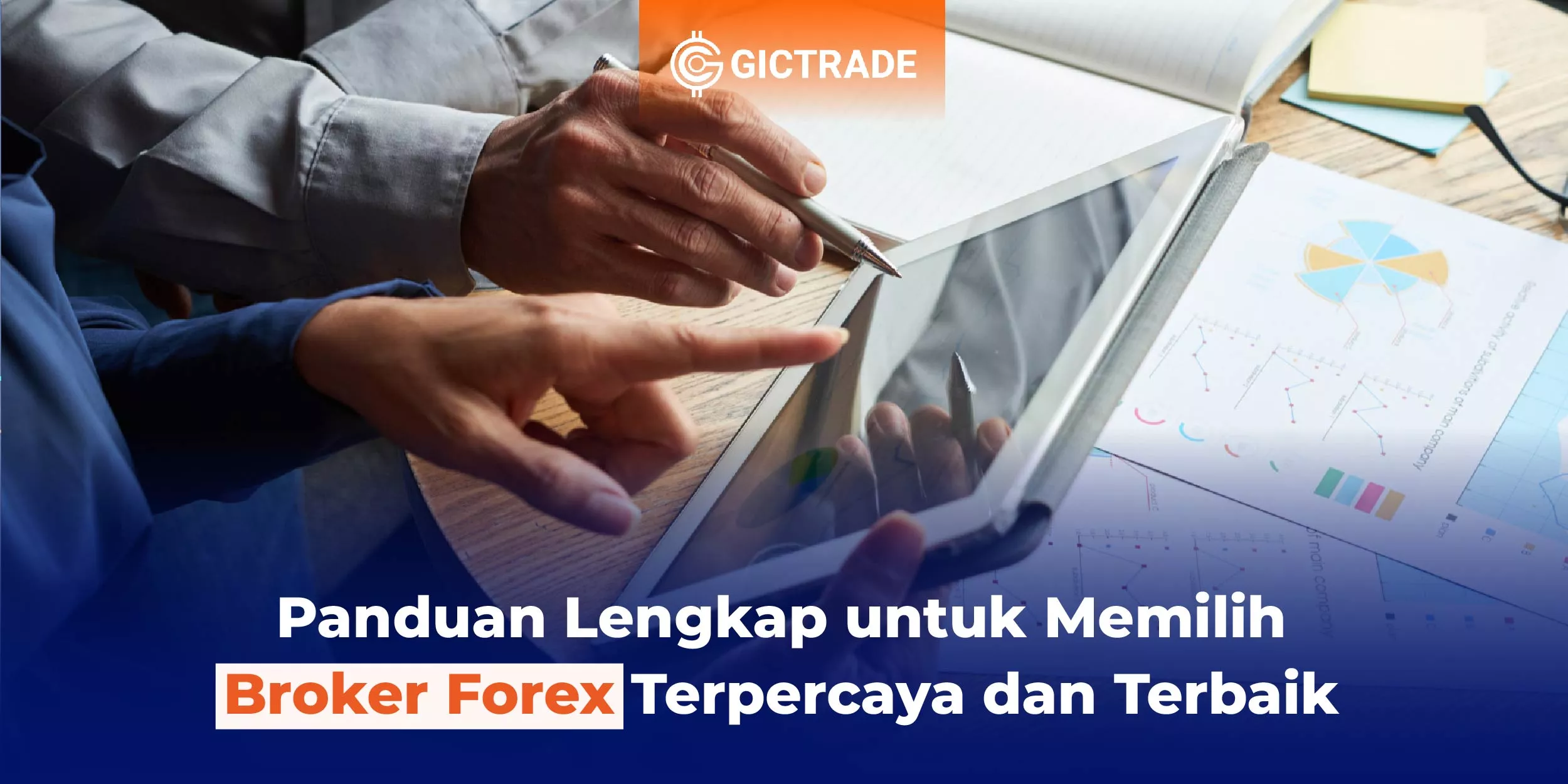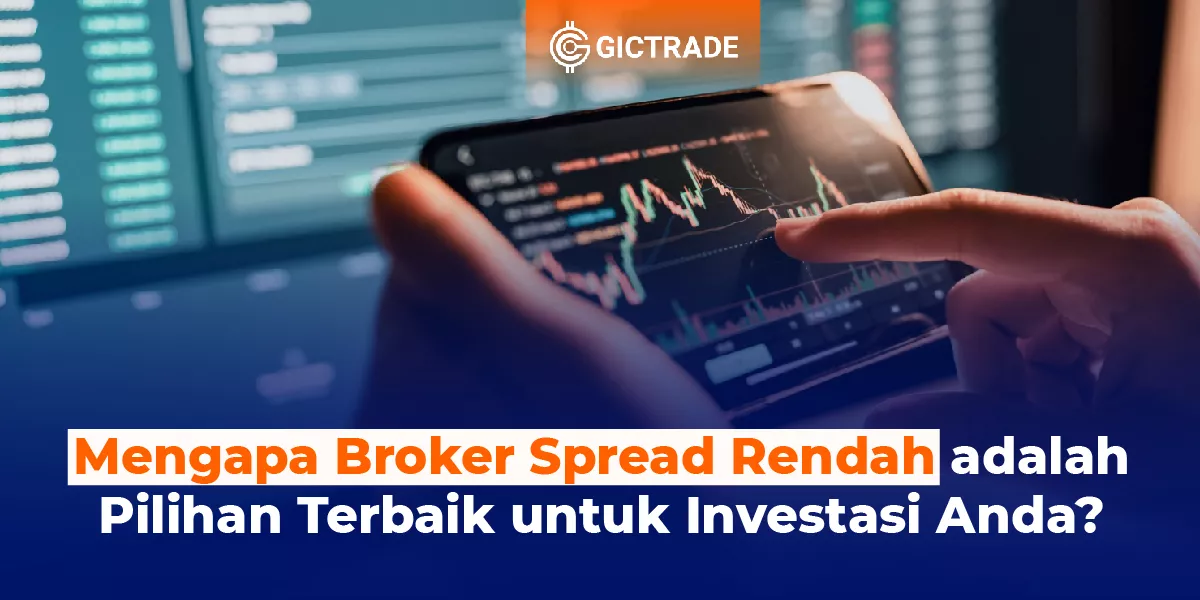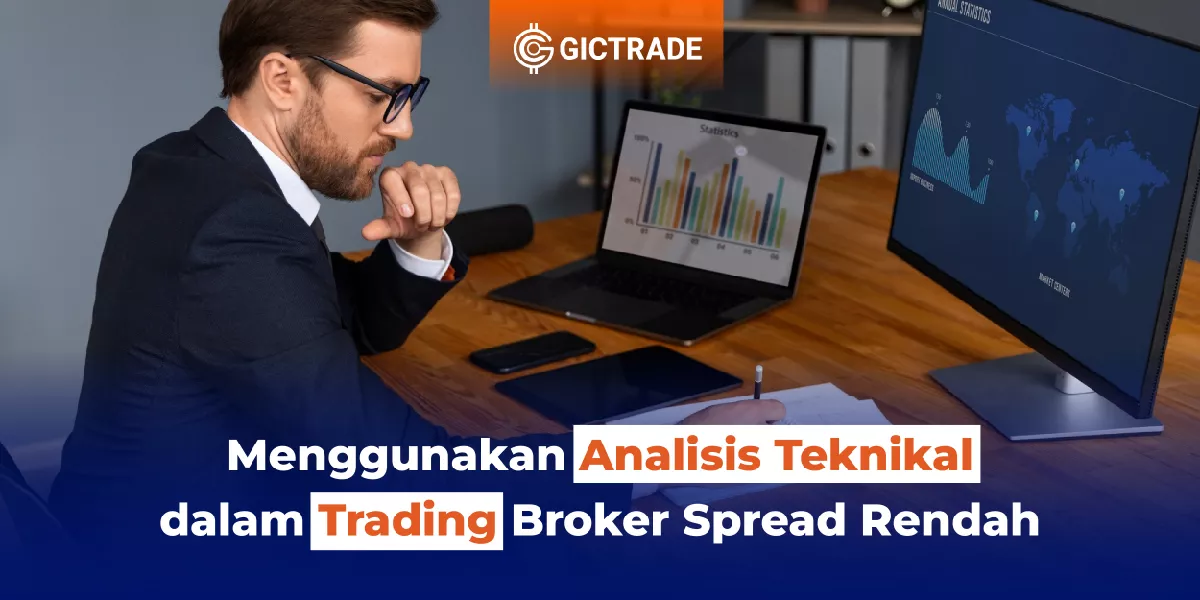Complete Guide to Choosing a Forex Broker - In the world of forex trading, choosing the right broker is a crucial first step to success. Forex brokers act as intermediaries between traders and the currency market. They provide trading platforms, analytical tools, and access to market liquidity.
However, with so many forex brokers available, choosing the most trusted and best one can be a daunting task. This article will provide a complete guide to choosing the most trusted and best forex broker in Indonesian, as well as valuable tips that will help you in the selection process.
Complete Guide to Choosing the Most Trusted and Best Forex Broker
.webp)
Table of Contents
1. Get to know Forex Brokers
Before starting to choose a broker, it is important to have a good understanding of what a forex broker is and the important role they play in currency trading. A forex broker is a company or individual who acts as an intermediary between traders (buyers or sellers of currencies) and the forex market.
In the complex forex market environment, forex brokers act as the primary link between individual traders and market liquidity. They provide trading platforms that allow traders to electronically trade currencies. Through these platforms, traders can monitor price movements, analyze the market, and execute their orders.
As a trading platform provider, forex brokers also provide direct access to the global currency market. They aggregate prices from various liquidity providers and provide them to traders, allowing traders to make transactions quickly and efficiently.
Forex brokers also offer a variety of analytical tools and features that help traders make informed trading decisions. They provide charts, technical indicators, market news, and other market analysis that traders can use to identify trading opportunities and manage risk. In addition, forex brokers are also responsible for keeping traders’ funds safe. Traders typically deposit their funds into a trading account provided by a broker, and it is the broker who is responsible for keeping those funds safe and secure. It is important to understand that forex brokers can operate in different jurisdictions and are regulated by different regulatory bodies. Before choosing a broker, traders need to ensure that the broker is licensed and regulated by a reputable financial authority. This regulation protects the security of traders’ funds and ensures that brokers adhere to ethical business standards and practices.
2. Regulations and Licenses
Regulation and licensing are important factors to consider when choosing a forex broker. Regulation and licensing indicate that the broker is subject to the rules set by the relevant financial authorities. This ensures the security of trader funds and ensures transparent business practices.
In Indonesia, the Commodity Futures Trading Regulatory Agency (Bappebti) is the authority responsible for overseeing futures trading activities, including forex. A forex broker regulated by Bappebti must meet certain requirements and conduct their business in accordance with established regulations.
Before choosing a forex broker, it is important to check whether the broker has a license from Bappebti. This license shows that the broker has gone through a strict inspection process and meets the security and quality of service standards set by the regulatory authority. In addition to a license from Bappebti, some forex brokers are also regulated by leading international regulatory agencies such as the Financial Conduct Authority (FCA) in the UK, the Australian Securities and Investments Commission (ASIC) in Australia, or the Cyprus Securities and Exchange Commission (CySEC) in Cyprus. These regulations and licenses provide great benefits for traders. First, regulations require brokers to separate trader funds from their own operational funds. This keeps trader funds safe and protects them in the event of bankruptcy or broker failure.
Second, regulation ensures that brokers conduct their business with integrity and transparency. They must adhere to strict ethical standards in providing services to traders. If there are any complaints or issues, traders can file a complaint with the regulatory authority who will handle the matter. It is important to remember that regulation is not a guarantee of profits or success in forex trading. However, choosing a regulated broker can provide traders with additional confidence and security. With regulation, traders can be sure that they are dealing with a broker who abides by the rules and has a trusted system.
3. Reputation and Reliability
Reputation and reliability are important factors to consider when choosing a forex broker. This relates to the integrity, quality of service, and trust that the broker provides to traders.
A broker’s reputation can be built through the experience and feedback of traders who have used or are using their services. You can find information about a broker’s reputation through various sources, including trader reviews, online forums, or broker comparison websites.
Look to see if the broker has a good reputation among traders. Find out if they are known for providing reliable service, fast execution, responsive customer support, and fair policies. It is also important to see if there have been any serious complaints or cases of fraud involving the broker.
Reliability is also an important factor in choosing a forex broker. A reliable broker will provide a stable trading platform, which allows traders to make transactions smoothly without any interruptions. Frequent technical disruptions or system failures can result in losses for traders, therefore, choosing a broker with a high reputation for reliability is very important.
In addition, reliable brokers also offer fast and accurate order execution. This means that orders placed by traders will be executed at the requested or expected price without significant slippage. The speed of order execution can have a significant impact, especially in short-term trading or during volatile market conditions. In addition to seeking information from external sources, also check the broker's website itself. See if they provide transparent information about their regulations, client fund policies, and withdrawal processes. An honest and transparent broker will provide traders with clear and complete information. Using a forex broker with a good reputation and reliability gives traders confidence and peace of mind. They can be sure that their funds are safe, the services provided are professional, and they are in a fair trading environment.
Recommended Articles :
|
Complete Chart Patterns: Continuation, Reversal, to Bilateral |
4. Trading Conditions
Trading conditions are one aspect that needs to be considered carefully when choosing a forex broker. Good trading conditions can affect your trading performance and results. Here are some factors to consider when evaluating a broker's trading conditions.
- Spread: Spread is the difference between the bid price and the ask price on a currency pair. Lower spreads mean lower transaction costs for traders. Look for brokers that offer competitive and stable spreads, especially for currency pairs you trade frequently.
- Order Execution: Speed and accuracy of order execution are crucial in forex trading. Check whether the broker offers instant order execution or market execution. Fast execution and no slippage (the difference between the requested price and the executed price) can save you from unnecessary losses.
- Leverage: Leverage is a facility that allows traders to control a larger amount than they have in their account. Check that the broker offers leverage that suits your trading style and needs. It is important to remember that high leverage can also increase the risk of loss.
- Commissions and Fees: Forex brokers may charge commissions or additional fees for each transaction. Pay attention to the broker’s fee structure, including deposit and withdrawal fees, transaction commissions, and inactivity fees. Choose a broker that offers reasonable and transparent fees.
- Trading Platform: A good and user-friendly trading platform is essential to make it easier for you to analyze the market and execute orders. Check whether the broker offers a reliable and intuitive trading platform, such as MetaTrader 4 or 5, which is equipped with important features such as charts, indicators, and other analytical tools.
- Demo Account: A demo account is a facility provided by brokers for traders to practice and test strategies without risking real money. Check if the broker offers a demo account that you can use to learn their platform, test strategies and gain trading experience without having to invest real money.
- Customer Service: Good quality customer service is essential in running a trading business. Make sure the broker provides responsive customer support, whether via live chat, phone, or email. Test their responsiveness by sending a question or request for information before you open an account.
5. Trading Platform
The trading platform is one of the key aspects to consider when choosing a forex broker. This platform is where you will conduct market analysis, manage trading positions, and execute orders. Here are some things to consider when choosing a good trading platform.
- Reliability: The reliability of the trading platform is very important. Make sure the platform you choose is stable and accessible without frequent technical issues. You don’t want to experience any interruptions or connection issues while trading. Also, check if the platform has a low delay time in executing orders.
- User Interface: A good and user-friendly user interface will make it easy for you to navigate and use the platform. See if the platform's appearance and features are easy to understand and use. Clear charts, comprehensive technical indicators, and powerful analytical tools can help you make better trading decisions.
- Order Execution: A good trading platform should offer fast and accurate order execution. Your orders should be executed at the requested or expected price without significant slippage. If the platform has an auto-execution or one-click trading feature, make sure you understand and can use it well.
- Additional Features: Check to see if the platform provides additional features that can enhance your trading experience. For example, some platforms offer a copy trading system that allows you to follow and copy the trades of other successful traders. Other features may include integrated market news, an economic calendar, or trading signals.
- Compatibility: Make sure that the platform you choose is compatible with the device you are using, be it a desktop, laptop, or mobile device. Platforms that are accessible via the web or mobile app allow you to trade easily wherever you are.
- Security: The security of a trading platform is crucial in protecting your personal data and information. Make sure that the platform you choose has strong security layers, such as data encryption and protection against cyberattacks.
- Customer Support: Check whether the trading platform you choose provides responsive customer support. If you run into any issues or have questions about using the platform, it is important to be able to contact the customer support team and get the help you need.
Choose a forex broker that offers a reliable, intuitive trading platform that suits your trading needs. Do research on the available platforms, read reviews from other users, and try a demo platform if possible. By choosing a good trading platform, you can carry out forex trading activities more effectively and efficiently.
Meet GIC, the Most Trusted Forex Broker Platform in Indonesia!
Not familiar with GIC? Let's get acquainted. Unlike other conventional brokerage firms, GIC through the GICTrade platform provides a solution for traders who do not want to be burdened with high trading costs. GICTrade is a peer-to-peer trading platform that brings together traders and market makers.
So, what's so special about GICTrade? As a platform that brings together trader and market maker, you as a prospective customer can certainly choose between the two, namely becoming a trader or a market maker.
GICTrade's role as a transaction venue provider can minimize costs and help maximize profits for traders and market makers as well as create a fair transaction atmosphere and results.
Traders will benefit from no commission fees and swap fees and low spreads due to the presence of market makers as liquidity providers. You can also join the trader community on Telegram GICtrade to ask fellow traders directly about their trading experiences.
Also follow GIC Instagram to get webinar information and various attractive prizes. In addition, on GIC YouTube, traders can also learn trading for free! What are you waiting for? More complete features that fully support you to start investing and trading forex through GIC. Make transactions simpler, safer, and more profitable.
6. Customer Service
The quality of customer service is also an important factor in choosing a forex broker. Make sure that the broker has a responsive customer support team that can be reached through various communication channels such as phone, email, and live chat. Good customer service will help you resolve your problems and questions quickly and effectively.
Recommended Articles :
|
BCA Credit Card Interest: Types, Calculation Methods, and Fees |
| Revealed! How to Make Big Profits in Forex Trading |
Frequently Asked Questions (FAQs)
1. What is leverage in forex trading?
Leverage in forex trading is a loan given by a broker to a trader to increase the potential profit (and loss) of a transaction. For example, with a leverage of 1:100, a trader can control a position worth $10,000 with a capital of $100.
2. How to check forex broker license?
You can check a forex broker’s license by visiting the website of the relevant financial regulatory authority in their country. Typically, regulated brokers will list their licensing information on their website.
3. What is the difference between MetaTrader 4 and MetaTrader 5?
MetaTrader 4 (MT4) is the older and more widely used trading platform, while MetaTrader 5 (MT5) is a newer version with additional features such as the ability to trade stocks and futures.
4. Are there any risks in forex trading?
Yes, forex trading involves risks. Currency price fluctuations can result in significant gains or losses. It is important to understand these risks and only use funds you are prepared to lose.
5. Is there a minimum deposit to start forex trading?
The minimum deposit to start forex trading varies depending on the broker you choose. Some brokers may have a minimum deposit of $100, while others may require a higher amount.
6. How to avoid forex broker fraud?
To avoid forex broker scams, make sure to do thorough research on the broker, check their license and regulation, and read reviews from other traders. Also, be wary of offers that are too good to be true and avoid brokers who ask for payment up front for no apparent reason.
Conclusion
Choosing a trusted and best forex broker is an important step in starting your trading journey. In this article, we have provided a complete guide and some important tips that you can follow when choosing a forex broker.
Make sure to check the regulation, reputation, trading conditions, trading platforms, and customer service before making a final decision. By choosing the right broker, you will have a strong foundation for success in forex trading.
Source :
- https://www.bappebti.go.id/: The official website of the Commodity Futures Trading Regulatory Agency to verify forex broker regulations in Indonesia.
- https://www.forexfactory.com/: A popular online forum for getting the latest information on the forex market and reviews of forex brokers.
- https://www.investopedia.com/: A rich online resource with articles on forex trading, education and market analysis.
 Last:
Last: 






